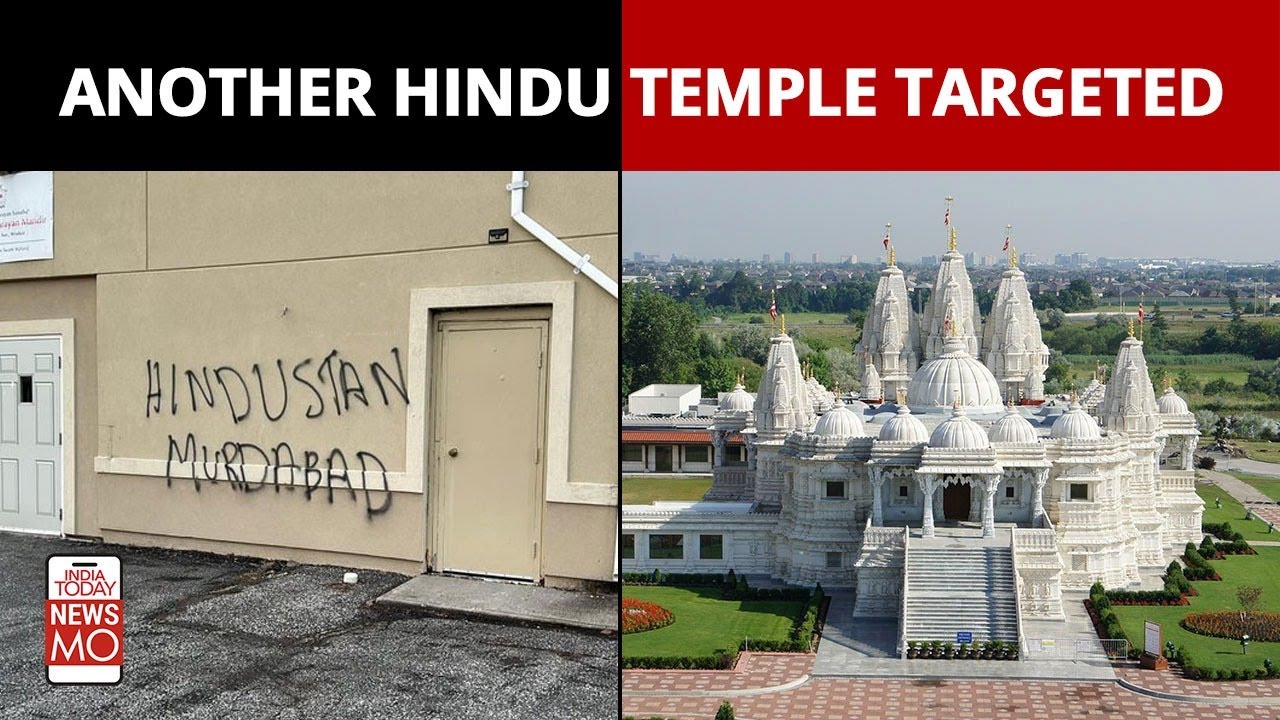


The Lakshmi Narayan Mandir in Toronto is set to host a consular camp on Saturday, and in light of recent violent incidents, the temple's management filed an application for an injunction to prevent protests within a 100-meter radius. The court noted that while violence is not guaranteed, the intimidation of elderly attendees at the temple for consular services or worship constitutes harm to both individuals and the wider community. The ruling also highlights tensions between pro-Khalistan groups, such as Sikhs for Justice, and India's consulate, calling for increased security measures and arrests in response to recent events.
Hinduism in Canada: Lakshmi Narayan Mandir Secures Injunction to Prevent Protests
Amidst recent tensions and concerns, the Lakshmi Narayan Mandir in Toronto has successfully secured a court injunction to prevent protests within a 100-meter radius of the temple. This decision highlights ongoing challenges faced by the Hindu community in Canada, particularly with regard to the presence of pro-Khalistan groups.
Background
Pro-Khalistan groups, such as Sikhs for Justice, have been actively protesting outside Indian consulates and Hindu temples in Canada in recent years. These protests often escalate into violence, with individuals attempting to disrupt consular services and intimidating temple attendees.
In the case of the Lakshmi Narayan Mandir, the temple's management filed an application for an injunction after a series of protest-related incidents. These included the intimidation of elderly worshippers, verbal threats, and property damage.
Court Ruling
On August 5, 2023, the Ontario Superior Court of Justice granted the temple's request for an injunction. The court acknowledged the potential for violence and the need to protect attendees. The ruling noted that while violence is not guaranteed, the intimidation of elderly individuals at the temple constitutes "harm to both individuals and the wider community."
FAQs
1. What is the significance of the Lakshmi Narayan Mandir?
The Lakshmi Narayan Mandir is a prominent Hindu temple in Toronto, serving a large and diverse congregation. It is a focal point for religious and cultural gatherings, as well as consular services provided by the Indian High Commission.
2. Why have pro-Khalistan groups been protesting outside Hindu temples?
Pro-Khalistan groups, such as Sikhs for Justice, advocate for an independent Sikh state in India. They have been targeting Indian consulates and Hindu temples to express their opposition to the Indian government's actions in the state of Punjab.
3. What are the concerns of the Hindu community?
The Hindu community in Canada has expressed concerns about the safety of attendees at temples and consular services. They have also voiced fears that the escalating tensions between pro-Khalistan groups and the Indian consulate could spill over into other parts of the community.
4. What has the Indian government's response been?
The Indian government has condemned the protests and worked with Canadian authorities to ensure the safety of its diplomatic missions and Hindu temples. It has also called for the arrest and prosecution of individuals involved in violent acts.
5. What are the ongoing challenges for Hinduism in Canada?
While the injunction provides some relief, the Hindu community continues to face challenges related to safety and security. There is ongoing concern about the potential for further protests and the need for increased protection by law enforcement agencies.

A lone ISIS gunman ambushed a group of US service members and civilians in Syria, killing two and injuring three. The gunman was eventually killed by partner forces, confirmed by the US Defence Secretary. This is the first attack on US troops in Syria since the fall of President Bashar al-Assad. The casualties were transported to a nearby garrison and their identities will be withheld until their next of kin have been notified.

Pakistan's Prime Minister, Shehbaz Sharif, caused a major stir in Turkmenistan when he decided to gate-crash a meeting between Russian President Vladimir Putin and Turkish President Recep Tayyip Erdogan after waiting for 40 minutes. This impulsive move showcases Pakistan's increasing diplomatic insecurity and diminishing geopolitical clout. As Sharif struggles to secure meaningful engagements with major powers, he also faces domestic crises and is under the control of Army Chief Asim Munir. Meanwhile, the event in Turkmenistan marked a milestone for the country's declaration of neutrality and its efforts to maintain independence from both Western and Russian influence.

During an international forum in Turkmenistan, Pakistan's Prime Minister Shehbaz Sharif faced an embarrassing diplomatic moment as he walked into a private meeting between Russian President Vladimir Putin and Turkish President Recep Tayyip Erdogan. Sharif had been waiting for over 40 minutes for his scheduled meeting with Putin, causing him to enter the ongoing conversation between the two leaders. The incident, captured on video and shared by RT India, has triggered widespread mockery on social media with users making jokes about Sharif's actions. This comes as Pakistan attempts to strengthen its ties with Russia, while Putin maintains a closer relationship with India.

The latest bout of border fighting between Thailand and Cambodia has escalated, with hundreds of thousands of civilians displaced and casualties on both sides. The renewed skirmishes have shattered a ceasefire proposed by U.S. President Donald Trump in July. The leaders of both countries have promised to continue their aggressive stance, causing further tension and concerns for the safety of civilians. This has even resulted in the withdrawal of Cambodia's team from a regional sporting event.

Notorious Naxalite commander Ramdher Majji, along with his group, surrendered to the police in Chhattisgarh. This surrender marks a milestone in the fight against Naxalism, as the state's Deputy Chief Minister states that 80 percent of the menace has been eradicated. With the government's resolved aim to eliminate Naxalism by 2026, the country is heading towards a permanent solution to this long-standing issue. Home Minister Amit Shah also noted the significant progress made in reducing Naxal violence, with only 10 percent of the nation's population currently affected compared to 120 million people in the past.

After the tragic fire at their club in Goa, owners Gaurav and Saurabh Luthra have been detained in Thailand and are expected to be brought back to India soon. The Indian agencies have been in constant communication with Thai authorities and have managed to locate the brothers outside the main city area. With their detention, the process for their deportation has been initiated and Indian agencies are coordinating with Thai authorities for their return. The article also explains the general procedure for deportation of foreigners from Thailand under immigration laws.

Two years after the shocking death of Dawn Sturgess from Novichok poisoning, a public inquiry has released its final report. The report, overseen by retired Supreme Court justice Lord Hughes of Ombersley, examined whether British officials had taken adequate precautions to prevent the attack on ex-spy Sergei Skripal and his daughter Yulia in March 2018. The inquiry also investigated whether Ms. Sturgess's death could have been avoided with timely public warnings about abandoned objects. Good Morning Britain correspondent Richard Gaisford reported live from Salisbury, where the attack first came to light, to reveal the disturbing findings of the inquiry.

The Indian Air Force (IAF) has found a solution to maintain its aging Jaguar fleet by obtaining over 20 retired aircraft from the Oman Air Force. These jets will be dismantled and used as spares, as global production of Jaguar has ceased. With this transfer, India will become one of the few countries to still operate the Anglo-French supersonic attack aircraft. The collaboration between India and Oman in this regard reflects their robust defense partnership.

In a monumental decision, UNESCO has officially named India's beloved festival of lights, Deepavali, to its prestigious Intangible Cultural Heritage List during a committee meeting at the iconic Red Fort in Delhi. The news was met with joyous celebrations and performances, with Prime Minister Modi expressing his pride and noting the global impact of Deepavali's inclusion. This marks the sixteenth element from India to be inscribed on the Representative List, solidifying the country's rich cultural heritage.

India's festival of lights, Deepavali, has been added to Unesco's list of Intangible Cultural Heritage, following in the footsteps of Durga Puja. Prime Minister Narendra Modi expressed his delight at the nomination, stating that the festival is closely tied to India's culture and ethos. The nomination process for Deepavali involved diverse communities and experts, showcasing the festival's reach beyond the country, as it joins India's 15 elements already on Unesco's list.